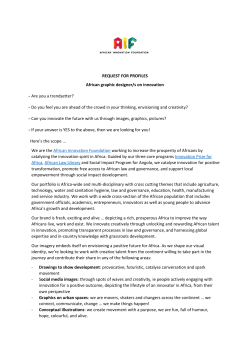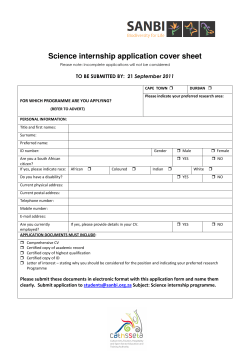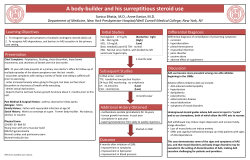
FALL 2015 - African American Studies
African American Studies Minor Requirements .......... 2 FAL L 20 15 New Faculty members... 2 Offered Fall 2015 AAS Classes ............. 3-4 African American studies PROMOTING SCHOL ARSHI P AN D DI ALOGUE ON ISSUES REL ATED TO AFRIC A AND ITS DI ASPORA. The African American Studies department of The College of New Jersey is an Interdisciplinary teacher-scholar community whose faculty embodies professional excellence, promotes engaged learning, and provides original intellectual contributions to their respective fields. As teachers of the arts, humanities, social sciences, and sciences, the department promotes the discovery and creation of knowledge, independent and critical inquiry, professional and scholarly activity, and student/faculty/community collaboration. Meet our Chair! Winnifred Brown-Glaude, Ph.D. Dr. Brown-Glaude is an associate professor with a joint appointment in the departments of African American Studies and Sociology. Dr. Brown-Glaude holds a Ph.D. in Sociology from Temple University. Her primary fields of research include race and ethnicity in the Anglophone-Caribbean; Race, Gender and Informal Economies; Gender and Globalization. Dr. Brown-Glaude teaches various courses on race, ethnicity, Latin America and women and gender studies. Her most recent book is Higgler’s in Kingston: Women’s Informal Work in Jamaica. She is currently working on her third book project, Feminist Mosaics: The Politics of Embodiment in the English Speaking Caribbean. CONTACT US... For more information about the AAS Department, go to: www.african-americanstudies.pages.tcnj.edu Like us on Facebook or follow us on Twitter! “Department of African American Studies at The College of New Jersey” (FB) and TCNJAFAM (Twitter) SSB 317 Karen Dubrule dubrulek@tcnj.edu Program Assistant afamstud@tcnj.edu (609) 771.2138 Benefits of an AAS Minor Students graduating with an African American Studies minor will embody the following learning objectives: Graduates will be... Knowledgeable of the strengths and weaknesses of the theoretical models related to African Diaspora courses, scholarship, and issues. Able to articulate an enhanced awareness of the socioeconomic and political implications and consequences of a multiracial world. Able to explain global constructions of race. Have an understanding of the diversity of African and its Diaspora’s voices. Able to identify women and men central to the history, religious practices, literary traditions, artistic production, intellectual movements, institutional developments, and study of people of African descent. AAS Minor Requirements: AAS 179: African American History to 1865 (formerly AAS 205) 1 Course Unit (crosslisted with HIS 179) AAS 180: African American History Since 1865 (formerly AAS 206) 1 Course Unit (crosslisted with HIS 180) Electives: 3 Course Units from A A S courses (or crosslisted sections) Welcome New Faculty members! This fall, the department of African American Studies is thrilled to welcome two new faculty members to TCNJ, Dr. Leigh-Anne Francis and Dr. Zakia Adair. Both professors will have a joint appointment with AAS and Women and Gender Studies and will teach a variety of courses for both departments. Zakiya Adair is an assistant professor in Women’s and Gender Studies and African American Studies. Dr. Adair attended graduate school at the University of Washington, in Seattle where she earned her Ph.D. in Women’s Studies. Her areas of specialization are transnational women's cultural history, African American history and black internationalism with specific focus on early trans-Atlantic expressive culture. She is the recipient of many fellowships; most recently, Dr. Adair was a National Endowment for the Humanities (NEH) Scholar in Residence at the Schomburg Center for Research in Black Culture 2013. Currently she is working on completing her first book length monograph that will explore the relationship between race, gender and nation in trans-Atlantic and transnational vaudeville, cabaret and music hall in the early twentieth century. Dr. Zakiya Adair Ph.D., University of Washington Dr. Leigh-Anne Francis Ph.D., Rutgers, The State University of New Jersey Leigh-Anne Francis holds a Ph.D. in United States and African American History, an M.A. in U.S. and World History, and a B.F.A. in Painting and Illustration. Currently she is working on completing her first book-length manuscript, “Bad Girls: Race, Crime, and Punishment in New York State, 1893— 1916,” that analyzes the intersections of gender, race and class by exploring crime and punishment, labor and community, through the lens of black women’s experiences while offering comparisons with imprisoned native-born and European immigrant white women. As a Rutgers graduate student, she was a volunteer instructor at Mountainvew Youth Correctional Facility for Men in New Jersey. When she is not teaching or researching, she enjoys spending time with her spouse, Jenny, and their one-year old twin sons, Rustin and Langston. Offered AAS Classes (Fall 2015) AAS 179 / HIS 179 : African American History to 1865 (*formerly AAS 205) Dr. Mekala Audain Monday/Thursday -- 9:30 - 10:50am (AAS-01/HIS-02); 12:30pm-1:50pm (AAS-02/HIS-01) An examination of the history of African Americans from their ancestral home in Africa to the end of the United States Civil War. The course encompasses introducing the cultures and civilizations of the African people prior to the opening up of the New World and exploring Black contributions to America up to 1865. AAS 180 / HIS 180 : African American History 1865 to Present (*formerly AAS 206) Dr. David McAllister Monday — 5:30pm-8:20pm An examination of the history of African Americans from the end of slavery in the United States to the civil rights revolution of 1950s and 1960s. This course is designed to explore the history of African Americans since the Reconstruction and their contributions to the civil rights revolution of the present era. AAS 208 / HIS 352 : Colonial and Modern Africa Dr. Matthew Bender Monday/Thursday — 11:00am-12:20pm This course explores African history from 1800 up to the present. Using case studies, it will examine how wide-ranging social, political, and economic processes, the slave trade, colonial rule, African nationalism, independence, and new understandings of women’s rights changed local people’s lives. AAS 240 / MUS 245: History of Jazz Dr. Michael Conklin Monday/Thursday — 12:30pm-1:50pm An introduction to jazz music through an examination of its content, history, and cultural legacy. The course begins with the emergence of jazz out of early African American musical forms, and considers the profound connection between the African American experience and the development of jazz. It is an examination of how jazz evolved through artistic and technological innovations as well as through cultural, commercial, and political forces. The course engages students in critical listening and research-based writing skills. AAS 252 / WGS 252: Gendering the Harlem Renaissance: Black Paris Dr. Zakia Adair Tuesday/Friday — 2:00pm-3:20pm (section 01) & 3:30pm-4:50pm (section 02) An international exploration of the Harlem Renaissance era, 1920 to 1935. Offered AAS Classes (Fall 2015) AAS 280 / WGS 260 : Women of African Descent in Global Perspective Dr. Winnifred Brown-Glaude Monday/Thursday — 8:00am-9:20am (section 01) & 9:30am-10:50am (section 02) Women of African Descent in Global Perspective, (formerly “Africana Women in Historical Perspective”) is a global, cross-cultural survey of the lives and contributions of women of African ancestry. Emphasis will be placed upon shared elements of African culture that, when impacted by colonialism and/or the Atlantic slave trade, resulted in similar types of resistance to oppression, and analogues cultural expression among the women of four locales: Africa, South America and the Caribbean, North America and Europe. Theoretical methodologies, historical narrative, literature, demographic data, material culture, representations of self, and representations by others will be explored to illuminate/explain the: History, Cultural artifacts, Cultural retentions and Self-concept. AAS 281 / SOC 281 : The Sociology of Race in the U.S. Dr. Winnifred Brown-Glaude Monday/Thursday — 12:30pm-1:50pm A broad sociological study of race in the dynamics of American power, privilege, and oppression. The course argues race, as a concept and social phenomenon, is fluid, malleable, and socially constructed and those characteristics have made it a persistent and useful feature in US historical development. AAS 282 / HIS 190: History of Race Relations in the U.S. Dr. Christopher Fisher Tuesday/Friday – 11:00am-12:20pm (section 01) & 2:00pm-3:20pm (section 02) A socio-historical examination of race as a category in the United States. The course approaches the United States as a multiracial society and discusses how the various racial groups negotiate their differences politically, economically, intellectually, socially, and culturally. AAS 376 / WGS 361 / HIS 365: African American Women’s History Dr. Leigh-Anne Francis Monday/Thursday – 11:00am-12:20am (section 01) & Thursday 4:00pm-6:50pm (section 02) A study of the experience of African American women in the United States, from both historical and contemporary perspectives. Through a survey of critical time periods, key social institutions, and crystallizing experiences, the course will explicate the role of African American women in shaping present American society. Readings, lectures, discussions, recordings and movies will be used to present a comprehensive and cohesive understanding of African American women. AAS 377 / LIT 377 : Early African American Literature to 1920 Dr. Piper Kendrix Williams Monday/Thursday – 9:30am-10:50am (section 01) & 11:00am-12:20pm (section 02) A study of selected African American Literature from the colonial period through Reconstruction, this course will build students’ knowledge and confidence as readers and critics of African American culture and society in the United States. We will look at these texts through a lens focused on the effects produced by struggles with American fictions of race, class and sex and their intersections with categories of gender, ethnicity and nation. The course will also explore the canon of African American Literature, its literary tradition, and the connection to and diversions from the canon of American Letters.
© Copyright 2025









